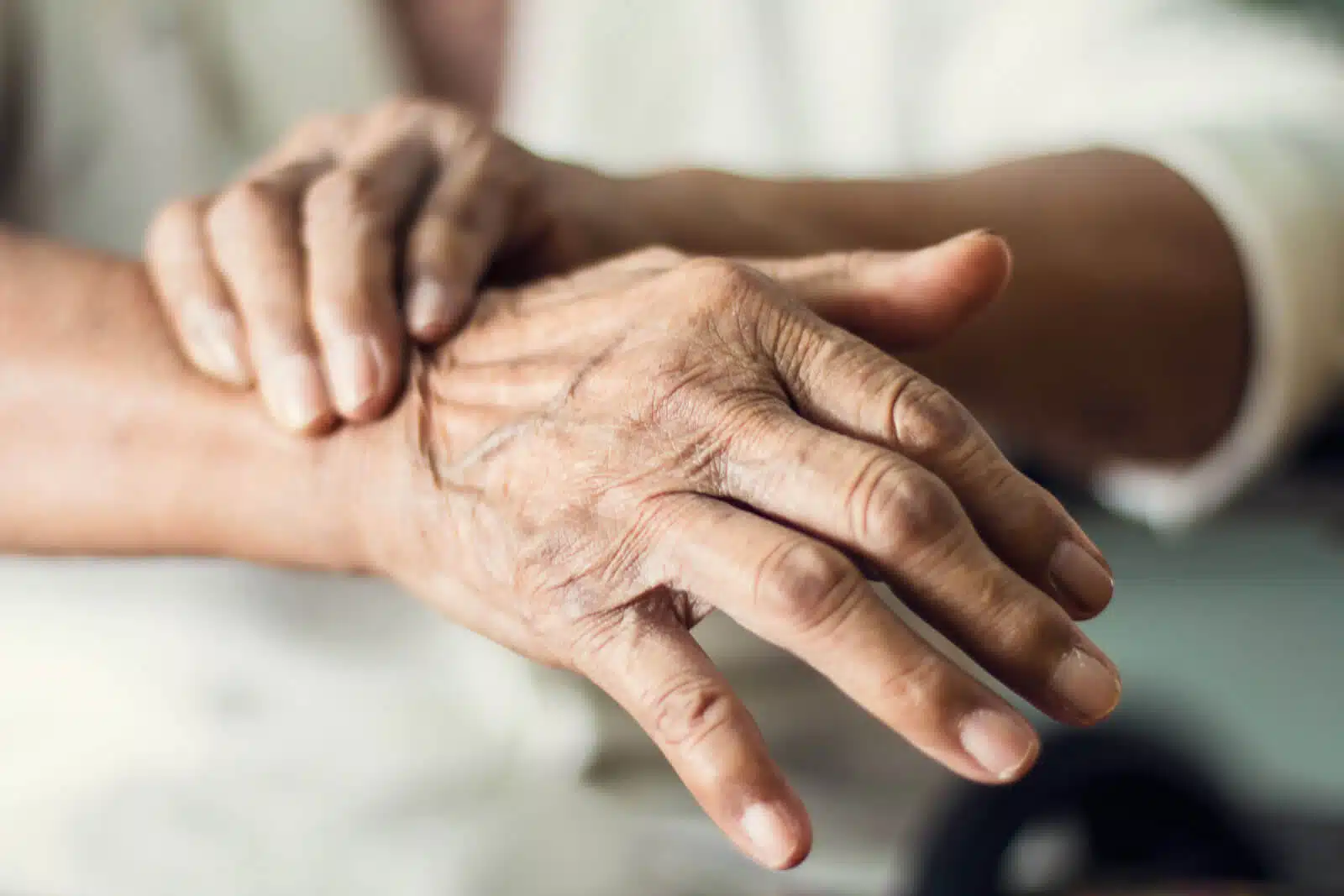Parkinson’s disease (PD) has a wide range of symptoms, both physical and psychological, that typically get worse over time. Whilst there is no cure for Parkinson’s disease, treatment focuses around mitigating symptoms and relieving them where possible through medications and other types of therapies. Parkinson’s disease treatment won’t stop the condition from progressing, but it can allow you to live more independently, and how you want to, for longer.
Due to the far-reaching nature of PD symptoms, including tremors, insomnia, memory problems and mood disorders, there are certain actions and lifestyle decisions you can make to try and control your Parkinson’s symptoms more effectively for longer. In this article, we’re going to explore some of the things you can do to ease your PD symptoms, as well as some of the actions that could potentially exacerbate symptoms.
Causes of Parkinson’s disease
Firstly, it’s useful to look at what causes Parkinson’s disease and therefore how it affects the brain and causes the symptoms. Parkinson’s disease originates in the substantia nigra area of the brain which is responsible for most of the brain’s dopamine production. Dopamine is important for a wide range of bodily functions and abilities, including:
- Sleep
- Movement
- Mood
- Motivation
- Attention
- Heart rate
When dopamine levels decrease, all of these things are affected. When a person has Parkinson’s disease, they lose nerve cells in the substantia nigra which naturally leads to a reduction in the production of dopamine, resulting in Parkinson’s disease symptoms. This gets worse over time.
It’s not immediately clear what the exact cause of PD is, but it’s widely agreed that it’s a mixture of genetic and environmental factors. It’s thought that around 10-15% of people with Parkinson’s disease have genetic mutations linked to the disease, but lifestyle and environmental factors play a significant role, too. For example, people who experience a traumatic brain injury may be at a higher risk of developing PD.
Parkinson’s disease affects men more than women, and it’s more common in those over the age of 60.
3 Actions that worsen Parkinson’s disease
Many patients ask, what worsens Parkinson’s disease? With the underlying cause of the disease being variable, identifying specific actions that could increase the progression of the disease isn’t always easy. Parkinson’s disease is incurable and, as yet, there is nothing that can stop the progression of PD, so the focus is largely on taking steps to avoid agitating or intensifying symptoms.
PD is very unique to every patient, with no two people experiencing the same combination of motor and non-motor symptoms. With this in mind, not every PD patient will be affected by the below actions, but they have been shown to help with PD symptom management.
1. High stress levels
Stress is a normal part of everyday life and is something we all feel from time to time. Whether it’s stress about money, health, work or family, there are several things that can cause you to feel overwhelmed. A PD diagnosis itself can be a huge cause of stress, and stress as a singular condition can cause a myriad of physical symptoms. These include:
- Heart palpitations
- Sleep disorders
- Shaking
Increased heart rate, insomnia, and tremors are all common symptoms of Parkinson’s disease. With stress symptoms mirroring PD symptoms, it’s clear to see how, if you’re stressed, you might find your PD symptoms worsen.
Stress is generally caused by external factors, so doing everything you can to minimise the cause of your stress is important. If your stress is caused by your health concerns, you find talking therapy to be useful to help you come to terms with your diagnosis.
2. Increased anxiety levels
Like stress, everyone feels anxiety from time to time. However, people with Parkinson’s disease are more likely to feel anxiety due to the decreased levels of dopamine in their brain. Again, like stress, anxiety can cause physical symptoms that mimic PD symptoms, such as sleep disruption, shaking, and an increased heart rate. If your PD already presents itself in the form of an increased heart rate or tremors, high anxiety levels can make these symptoms worse.
Many people with PD and anxiety find that selective serotonin reuptake inhibitors (SSRIs) and selective serotonin and norepinephrine reuptake inhibitors (SNRIs) can help to control symptoms.
3. Reduced exercise / activity levels
Exercise and physical activity is intrinsic to maintaining good general health, and exercise is a core component of helping to manage physical Parkinson’s disease symptoms such as loss of balance and muscle stiffness. Whilst exercise won’t stop these symptoms from progressing, it can help to relieve some of the associated pain.
For example, if you find that your muscles routinely feel stiff, stretching or slow walks could be beneficial. On the other hand, if your PD symptoms are mild, you could still undertake more vigorous exercise like swimming or cycling. If you don’t exercise or try to move your body as much as possible, you might find that your physical capabilities deteriorate faster.
Treating Parkinson’s disease
Parkinson’s disease isn’t curable, but there are a few different options that can help you to maintain a good quality of life and keep symptoms under control for longer. They include:
Medication
There are three main types of medication that people with PD may be prescribed to try and control movement related symptoms like tremors. The main medications are:
- Levodopa – Most PD patients take levodopa at some point. It turns into dopamine which can help to aid nerve transmitters in the brain and improve movement.
- Dopamine agonists – Dopamine agonists are similar to levodopa but have a slightly milder effect. They may be taken alongside levodopa.
- Monoamine oxidase-B inhibitors (MAO-B) – MAO-B medications increase dopamine levels by blocking enzymes called monoamine oxidase-B which break down dopamine. They can be used in conjunction with both levodopa and dopamine agonists, although on their own, MAO-B medications are milder and they have fewer side effects.
Other medications may include:
- Catechol-O-methyltransferase inhibitors (used in the later stages of PD)
- Apomorphine (injected singularly or infused via a pump)
- Co-careldopa (a type of levodopa given via a tube in the gut)
Medications don’t work for everyone and, as PD progresses, tend to become less effective, meaning doses are regularly changed which can cause a range of unpleasant side effects in some people. If you’re on Parkinson’s medications and find that the side effects are making life difficult, speak to your specialist.
Surgery
Some Parkinson’s patients are suitable candidates for surgery. Known as deep brain stimulation, a device comparable to a pacemaker is placed in your chest, with one or two wires running under the skin and into specific areas of your brain. The device produces an electric current which can stimulate the brain and help to ease symptoms in some people.
Lifestyle modifications
Aside from medication and surgery, there are a few lifestyle changes you can make to help ease certain symptoms. Changes may include:
- Reducing caffeine intake
- Implementing a rigid bedtime routine to help with insomnia and sleep problems
- Eating soft foods to aid swallowing difficulties
- Doing swallowing exercises to reduce dribbling or drooling
- Doing pelvic floor exercises to help with incontinence
Exercise
Depending on the severity of your physical symptoms, exercise may be difficult, however, it’s important to try and stay as active as possible. If your symptoms are mild, continue with usual sports for as long as you can. If your symptoms are more severe, consider doing what you can, even if it’s sitting down exercises or a slow walk each day.
Meditation / mindfulness
Mindfulness is a complementary therapy for people with PD that some find to be useful. Parkinson’s UK has a mindfulness meditation toolkit for PD patients which you might find useful if your cognitive abilities and general awareness is being impacted by PD.
Physical therapies
Due to the way PD can impact your physical health, physical therapies can help you to maintain your quality of life for longer. There are three main types of physical therapies you might find useful as a PD patient, including:
- Physiotherapy – Physiotherapy focuses on relieving joint and muscle stiffness or pain, with the aim being to relieve symptoms and help you retain your coordination, flexibility, and motor skills.
- Occupational therapy – Occupational therapy focuses on specific areas of everyday life that you’re having trouble with, such as getting dressed.
- Speech therapy – Some PD patients find their speech is impacted. Speech therapy looks to improve communication where possible.
Psychotherapy
Psychotherapy is a branch of talking therapies that can help people with PD who may be struggling with several non-physical symptoms. This may include talking through things like stress, anxiety, depression, and coming to terms with a diagnosis.
Parkinson’s disease treatment at Dementech Neurosciences
At Dementech Neurosciences, we are experts in Parkinson’s disease. We provide a multifaceted approach to treatment and have a leading team of therapists and neurologists who can help you understand your diagnosis and follow a bespoke treatment plan comprising several elements to keep your symptoms under control and increase your quality of life for as long as possible.
To find out more about how we treat Parkinson’s disease at Dementech, please contact us.
FAQs
Below, we’ve answered some most commonly asked questions about Parkinson’s disease and what could make it worse.
What should Parkinson patients avoid?
There are a few different things patients may want to consider to avoid worsening Parkinson’s disease. This may include situations or events that trigger a stress or anxiety response, and avoiding sedentary behaviours or lifestyle choices.
Can anything trigger Parkinson’s disease?
The exact cause of Parkinson’s disease is not known, but it’s thought that genetic mutations and environmental factors such as a head injury can increase your risk of developing Parkinson’s disease. Making lifestyle choices such as eating healthily, exercising regularly, and reducing stress or anxiety levels may help to decrease the likelihood you might develop Parkinson’s disease, but this isn’t guaranteed.
Can emotional stress cause Parkinson’s?
Emotional stress is not considered a direct cause of Parkinson’s disease. However, research suggests that stress can damage dopamine cells, and damaged/reduced dopamine cells are responsible for Parkinson’s disease, so there could be a link.
Can you prevent Parkinson’s from getting worse?
Parkinson’s disease is incurable which means there is no way at present to stop the disease progressing; however, there are several treatment options that can help you to maintain a higher quality of life for longer. Common treatments include medication, surgery, and therapies such as physiotherapy. Disease progression and therefore treatment varies from patient to patient.





